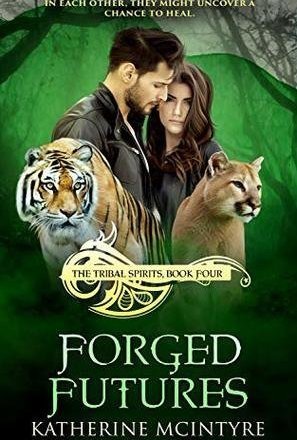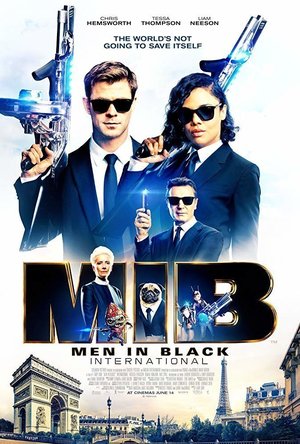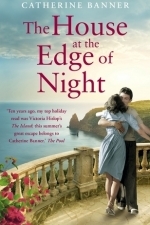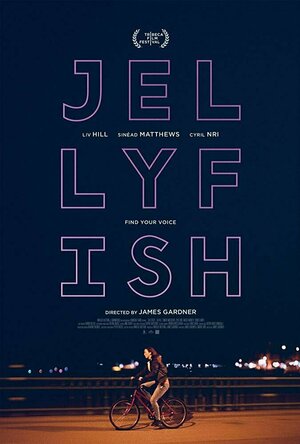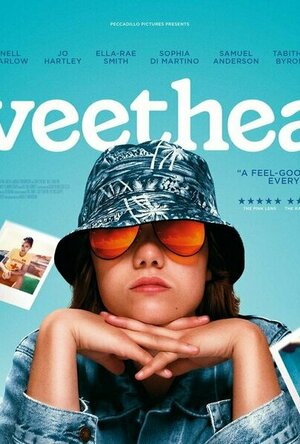Debbiereadsbook (1650 KP) rated Forged Futures (Tribal Spirits #4) in Books
May 30, 2019
This is book four in the Tribal Spirits series, and I would STRONGLY recommend you read books one through three first. There is an ongoing story arc that rears its ugly head again, and you need to know the devastation this has caused before now.
Lana’s husband was killed by the Landsliders last year, and she is existing. She isn’t surviving, or living, just existing. When those Landsliders come after Lana, Lucas, of the East Coast Tribe, is back in town to find out why. To get the shaman who has been at the right hand of the man who betrayed The Tribe. Having to stay in Lana’s house though, wasn’t in the plan but the tiger within Lucas demands he stay, to keep her safe. When they realise the Landsliders are looking for a device that Lana’s dead husband stole from them, the Red River and Silver Springs packs prepare for all-out war on the Landsliders. But what about after? Lucas will leave and Lana will be left alone again. Won’t they?
Like I said, book 4 in the series, and I think, maybe my favourite of the four so far. Can’t tell you why, though, but that’s my feeling and ya’ll know I’m ALL about the book feelings!
Lana is just about getting by. As a cat, she needs that physical connection and since her husband’s death, she gets it only from her friend, Ally. Which, while lovely, it doesn’t quite help, you know? Lana’s attraction to Lucas was as unexpected as it was unwanted. Lana feels guilty for cheating on her husband, even though he is gone. Once Gavin’s friends are made to see how much she needs this with Lucas, she jumps all in.
As Tribe, Lucas moves around, having only his family home as a base. Staying with Lana makes him see what he has been missing. Coming home to someone who gets him, on a deep level that no one, not even his Tribe mates, do. Lana SEES Lucas, she really does.
But what I particularly loved about this one, what made it stand out, was there was none of that MINE thing that usually comes with shifter mates. There was attraction, and feelings and emotions, yes, and these grew over time, but that immediate MINE moment? Nothing, not until they were fully mated, and it was a kind of “OH!” moment for Lana and Lucas and I really loved that. While they were taking comfort in each other, the mating bonds formed and neither realised til that moment. Loved that!
There are many secrets that come out here, and poor Lana bears the brunt of them.
Sierra and Dax; Jer and Raven play a huge part here, but Finn and Navi are only mentioned.
With one half of the head of the Landsliders now disposed of, lets hope in the next book they can get rid of them entirely. And I believe that Drew, the Landslider who turned against them, gets his story next. The bad boy does turn good here, fighting for the packs and there are some mahoosive clues (unless I’m totally dense and misread them totally wrong!) as to who might be Drew’s mate. I hope I did not read them wrong, cos the cat in question clearly has feelings for Drew and vice versa, and they are no clearer then when they are “stuck” So, please let it be her!
5 full and shiny stars.
**same worded review will appear elsewhere**
Lee (2222 KP) rated Men in Black International (2019) in Movies
Jun 16, 2019
The movie begins in 2016, with Agent H (Chris Hemsworth) and High T (Liam Neeson) as they ascend the Eiffel Tower, interrupting a man who is about to propose to his partner, before saving the world from an incoming alien race called The Hive. Then we jump back 20 years into the past to a family who are disturbed one night by a cute little alien in their back garden. As the young daughter, Molly, hides the alien in her bedroom, she looks out of her window to see her parents as they are neuralysed by a couple of Men in Black.
Back in present day, Molly (Tessa Thompson) is now all grown up, but hasn't forgotten that eventful night. While working in a call centre, she uses her computer to connect to satellite equipment in order to track alien landings and therefore try and gain access to the Men in Black, and hopefully get a job with them. Eventually finding her way into their headquarters, she is recruited by Agent O (Emma Thompson) and sent on her first mission, where she partners up with Agent H. The pair get caught up in a mission involving an assassinated alien VIP and some kind of super weapon. And, as the title of the movie suggests, plenty of international travel, as we switch between New York, London, Paris and Marrakesh.
The problem is, whereas the original Men in Black boasted a lot of humour, along with some great visual gags and action and a great double act, in the form of Will Smith and Tommy Lee Jones, this movie does nothing to successfully recapture any of that. As much as I love Chris Hemsworth, I felt that he was the worst thing about this movie. Somebody simply thought they'd take the character of Thor and try to have that for the entire movie, but without making him funny, heroic or even that likeable in the process. As with Dark Phoenix recently, a great cast is let down by an awful script, with any attempts at humour or entertainment falling completely flat.
Elsewhere, the fun and wacky inventiveness behind the different alien species in the original movie is completely absent here. Apart from some interesting and formidable twin villains, there's a fairly wasted role for Rebecca Ferguson as a three armed ex lover of Agent H. Otherwise, the main alien throughout the movie is just an annoying little CGI character.
To be fair, there are a couple of fun action sequences and some nice visuals, but overall this is just a completely forgettable and unnecessary movie. Here's hoping that Toy Story 4 will finally bring us a worthy blockbuster when it opens later this week.
Hazel (1853 KP) rated The House at the Edge of the Night in Books
Dec 7, 2018
Castellamare, a small island off the south coast of Italy, is the perfect setting for a captivating epic tale that traces a family from the beginning of the 1900s until the more recent year of 2009. Centred at the island’s only bar ‘The House at the Edge of the Night’, the island inhabitants suffer through two world wars, fascism, tourism and recession, however, the bar determinedly stays standing. But what happens in the rest of the world is largely ignored by the island dwellers that prefer to come to the bar to learn about friendships, betrayals and love affairs.
<i>The House at the Edge of the Night </i>begins on the mainland where the Dr Esposito removes the foundling Amadeo from care. Following in his foster father’s footsteps, Amadea Esposito trains to be a doctor and eventually lands himself a position on Castellamare. Having never had a doctor on the island before, Amadeo is welcomed by almost everyone, however, an illicit affair puts an end to his career. Fortunately, The House at the End of the Night provides Amadeo with an income and a home for his new wife, Pina, and his four children.
The story takes the reader through the Second World War, something that is interesting to read from the Italian’s point of view. Rejecting fascism, the Islanders are enraged when their boys are called up to join the war, especially as many, including Amadeo’s three boys, never return. With only a daughter, Maria-Grazia, remaining, the Esposito’s keep the bar going for lack of anything better to do.
But war brings good things as well as bad. Washed up on sure, the British soldier Robert brings good luck to the superstitious villagers, eventually marrying the lovely Maria-Grazia. The story continues through the childhood of their unruly boys, coming to an end as their granddaughter reaches adulthood.
A doctor and a barman, Amadeo also had a love for stories. Listening to his patients and patrons fantastical tales, Amadeo keeps note of them all in his personal notebook. Split into five parts, the book contains a story at the beginning of each section that, although mythical, set the scene for the subsequent narrative.
Alienated from the rest of the world, the Islanders are stuck in their ways, attributing any luck – good and bad – to their patron saint, Sant’Agata. Whenever life gets tough, the people on Castellamare turn to prayer, which although is part of their Catholic faith, often comes across as superstitious and irrational. They refuse to believe any logical explanation, preferring to regard their island as a magical, preternatural site.
There is no specific storyline with the usual climax and conclusion; instead, it works as a biography of a fictional family. It is interesting to regard the impact of the rapidly developing world on the island, from the introduction of a building society and the eventual launch of the Europe – something that the Islanders are naturally against. The inhabitants of Castellamare come across as naïve, but their backgrounds and beliefs are far more interesting than the average person.
<i>The House at the Edge of the Night</i> is a story of stories. It provides more than to be expected from a novel. Catherine Banner writes of beautiful settings, compelling characters and fascinating events that both amuse and entertain in a moving way.
With Victoria Hislop’s novels such as <i>The Island</i> being all the rage amongst many female readers, Catherine Banner’s <i>The House at the Edge of the Night </i>is destined for success. It is a great book to read on holiday or at home, and perfect for book clubs. This book is the ideal escape from the stresses of everyday life.
Darren (1599 KP) rated Jellyfish (2018) in Movies
Dec 8, 2019
Story: Jellyfish starts as we meet school student Sarah Taylor (Hill) who is in struggling through her drama classes, taking care of her young siblings, while trying to work to give them any sort of extra money, her mother Karen (Matthews) is unemployed suffering from a mental illness.
When Sarah’s teacher Adam Hale (Nri) sees her talent for comedy, he pushes her into trying stand up comedy for a show, just when Sarah’s life starts to fall apart, with her losing her job and the family losing their benefits because of her mother not attending her meetings. Sarah is left needing to turn to darker sides of her life, to make sure her siblings stay with her and don’t get put into the foster system.
Thoughts on Jellyfish
Characters – Sarah is a 15-year-old girl that must look after her younger siblings, while her mother is struggling with her own mental illnesses, Sarah is trying to get through her GCSEs, working part time and being the only adult in her house, she is facing a future that isn’t going to happen unless things change quickly, everything is slowly piling up on her, with life situations she shouldn’t have put on her. Karen in the mother who has been suffering through depression making it difficult for her to even get out of the house to keep the benefits coming in. Adam Hale is the drama teacher that does see some potential in Sarah, he encourages her to find her talent for comedy, being supportive, where nobody else is. Vince is the boss that is trying to be strict, he gives Sarah chances unaware of her problems at home, even if he ends up being like any boss who hasn’t gotten more out of their own life.
Performances – Liv Hill gives us one of the strongest performances you will ever see, from every expression of pain she is going through, to just holding in the explosion of emotion that wants to come out of her. Sinead Matthews does make her character look like she is struggling with life. The rest of the supporting cast are strong, they all let Liv take the centre stage.
Story – The story here shows a 15-year-old that must take care of her younger siblings, manager school life and work life just to keep a roof over their heads. This is a story that will put a startling light on how some children will be living and just what they will need to do to get through each day, it shows the poverty line in England and how people will often not even give you the time of day to see what is wrong with somebody’s life, with only one person trying to offer support to Sarah. We see just how desperate she has become to make sure the family stays together even going against the law in her attempts. You will find yourself being incredibly moved by the struggles of Sarah and watching her slowly see her life unravel makes you want to help her.
Settings – The film is set in Margate a small coast town that doesn’t have the luxury life many people living there would have, it shows that small towns don’t offer big futures for people.
Scene of the Movie – The routine.
That Moment That Annoyed Me – Is drama the only class Sarah takes?
Final Thoughts – This is one of the most emotionally charged movies you will see, we have a truly brilliant performance that will leave you feeling heart broken by what Sarah goes through, a must watch.
Overall: Brilliant.

D&D Lords of Waterdeep
Games
App
*Cross platform online play! Join your friends on other platforms!* *New In-game chat feature. Stay...

Scanner Radio - iPad Edition
News and Social Networking
App
★★★★ The best selling Scanner Radio for the iPhone comes to the iPad! ★★★★ Listen to...

National Rail Enquiries: Train journey planner
Navigation and Travel
App
Stay on track with the free National Rail Enquiries App, Great Britain’s number one destination...

Seapilot for iPad
Navigation and Utilities
App
Professional marine navigation used to require an expensive GPS plotter. Now, same technology used...
Bob Mann (459 KP) rated Sweetheart (2021) in Movies
Sep 20, 2021
Positives:
- What a great ensemble cast! It's all headed up by Nell Barlow, amazingly in her feature debut. Nell manages to perfectly deliver the hair-pullingly frustrating unpredictability of a teenage girl: always planning to go off doing something worthy like "knitting jumpers for elephants in Indonesia". But she manages to keep the portrayal just the right side of parody, not straying into 'Kevin and Perry' territory. "What's wrong with you?" asks her mother. "I'm 17. Everything's wrong with me" she replies. It's an immaculate performance for someone so young.
- Jo Hartley is also fabulous as A. J.'s mum, a lost soul struggling with her own worries, without having those of AJ to add to them. It's not portrayed as a typical 'Mum v Teen' battle, but beautifully nuanced. "Just because you're a lesbian now, it doesn't mean you have to dress like a boy" she pleads with A. J.
- If you're trying to place her, Ella Rae-Smith was the striking girl in the baseball cap in Netflix's "The Stranger". She is also wonderful here, as the 'hot girl' who you think has it all but is underneath deeply troubled and conflicted. A sex scene (beautifully lit and filmed by Emily Almond Barr and Matthew Wicks) manages to show absolutely nothing but is deliciously erotic as a result.
- The writing by Marley Morrison feels very autobiographical. And, as I found through reading this Guardian article about Morrison's gender-journey, there is a lot of personal experience in here. It's clever that the film is claustrophobically set in the remote holiday park (actually the real Freshwater Beach Holiday Park near Bridport on the Dorset coast). If it had been set in a big city like London, AJ could have constantly fled from her feelings, never resolving them. Here, she is constantly running into Isla.... there is no escape.
- I also very much liked the relationship written between A. J. and Steve. Steve is almost the safety valve on the pressure cooker, always helpfully allowing some steam to escape. It adds warmth to the story.
- For such an indie picture, there's a range of great tunes on the soundtrack: mostly from bands I have never heard of (probably making it affordable). I'm not sure if there's to be a soundtrack album released, but it's worth a listen if so.
Negatives:
- I wasn't fond of the sound mix on the film. Some of the dialogue was indistinct.
- A. J. gives us an occasional running commentary of her thoughts as a voiceover. Regular readers of my blog will know my thoughts on this subject! I'm not sure if it added much to the story: a 'show-not-tell' approach would have been my preference.
Summary Thoughts on "Sweetheart": I likened this film to 1980's "Gregory's Girl", and that's a great compliment. That movie made stars out of John Gordon Sinclair and Clare Grogan. I'd predict similar great things for Nell Barlow, Ella Rae-Smith and particularly for writer/director Marley Morrison. I'll very much look forward to Marley's future projects.
It's a cracking little British film. It deserves a major cinema release, but I suspect this is one that you might need to hunt out at your less mainstream cinemas. But please do so - it's well worth it. Very much recommended.
(For the full graphical review and video, check out #onemannsmovies on the web, Facebook and Tiktok. Thanks.)
